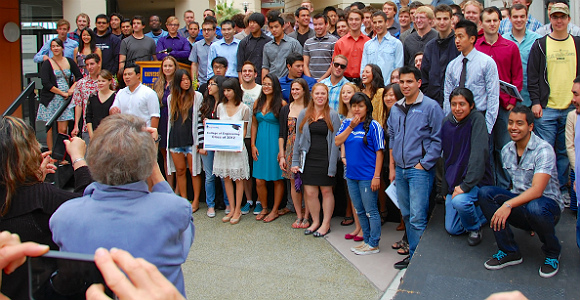
Graduates of UCSB College of Engineering pose for graduation photo. (Photo Credit: Glenn Beltz/Flickr)
The nation is slowly, but surely recovering from the Great Recession, as jobs are added and wages grow. At first glance, the numbers look good, but it’s a mixed bag for Millennials, especially those living in California.
In a new report issued by Young Invincibles titled, “Where Do Young Adults Work,” the research shows Millennials are finding employment. The catch is that the wages for the generation are going down, which is not good news to young adults who are possibly saddled with student debt and the rising cost of living.
The report showed the industries young adults have gravitated toward in all 50 states. In California, the business and professional sector is the most popular area for Millennials. According to Tom Allison, co-author of the study along with Konrad Mugglestone, Millennials are getting jobs, but they are still feeling the effects of the recession and that will have ripple effects into the future.
“So, in 2008 those jobs in professional and business earned a median wage of just under $40,000,” said Allison. “But in 2013, which is the most recent data available, the median wage was just under $38,000. That reduction of $2,000 in wages in the last few years, that’s money that could be going to saving up for a house, starting a family and of course paying off the massive amount of student loan debt that we know young people are dealing with.”
And for younger Millennials, ages 18-24, the jobs are in a different category. “We’re definitely seeing a growth in the low-skilled, low-waged jobs over time,” said Allison. “Unfortunately, the jobs that are available and the jobs that young people can get are overwhelmingly in retail and wholesale and leisure and hospitality.” But, he added that many of the younger Millennials are also attending school while working in those fields. So, it may not be a long-term issue.
Now that these numbers affirm the problem, what is the solution? The report recommends several policy solutions including increasing apprenticeships, boosting the Pell grant to match the true cost of college and holding post-secondary institutions accountable so that degrees lead to jobs.
One recommendation, giving students and families the best information about where to go to college and which fields of study lead to high-demand jobs, is already in the works in California. AB2148, signed by Governor Jerry Brown earlier this year and supported by members of the Workforce Action Team, requires that the California Workforce Investment Board (CWIB) work with the Governor to gather data from all the agencies involved in career technical programs and workforce investment to better track students’ progress while in school and also when they are out in the labor market.
Young Invincibles is also working with the Foundation for California Community Colleges and the California Community Colleges Chancellor’s Office to create a mobile app that will give students, particularly those in underserved communities, information on education pathways that lead to high-demand jobs.
And, Allison has advice to young adults deciding on their future; “Be clear-eyed about the economic situation in California and across the country and try and come up with a plan for your post-secondary education or even job training that’s going to equip you with the skills that’s going to get you the good job – a job that’s not only going to provide a certain level of economic stability, but also something that you’re happy with.”

